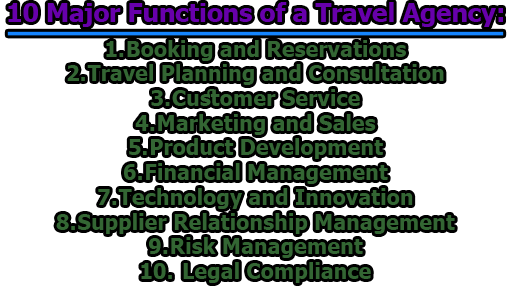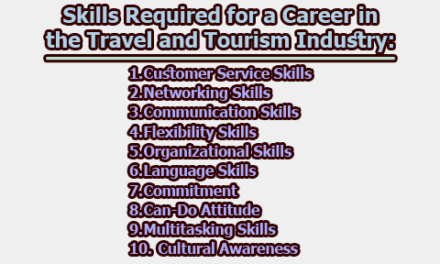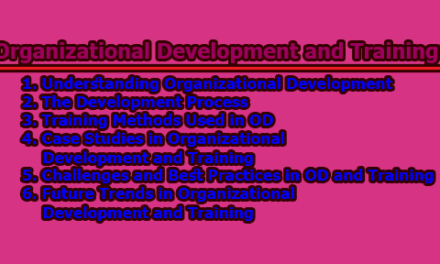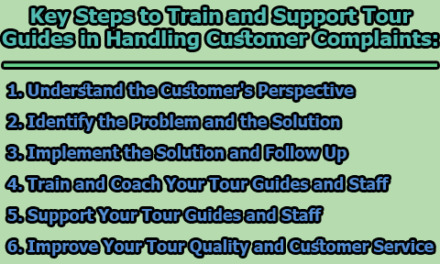A travel agency is a company or organization that specializes in providing various travel-related services to clients. These services may include booking flights, accommodations, transportation, tours, and other travel-related activities. Travel agencies may also offer travel insurance, visa assistance, and other related services. The primary goal of a travel agency is to make travel planning and booking easier and more convenient for their clients. They often have access to exclusive deals and packages, as well as insider knowledge about destinations, making them a valuable resource for travelers. Travel agencies may operate online, through a physical storefront, or a combination of both. Some agencies may specialize in certain types of travel, such as luxury travel, adventure travel, or group travel. In the rest of this article, we are going to present you with 10 major functions of a travel agency.
Definitions of Travel Agency:
Some of the necessary definitions are given below:
According to Investopedia, “A travel agency is a business that helps individuals and groups plan, book, and execute trips to various destinations.” These agencies have access to a wide range of travel-related services and products, including flights, hotels, rental cars, tours, and activities. By leveraging their expertise and relationships with suppliers, travel agencies can often secure better deals and packages for their clients. They may also provide valuable advice and recommendations on destinations, activities, and accommodations based on their experience and knowledge of the travel industry.
According to Small Business Chronicle, “A travel agency is a service provider that specializes in offering various travel-related services to customers.” These services may include flight bookings, hotel reservations, ground transportation arrangements, and tour packages. Travel agencies can help customers save time and effort by taking care of all the details of their trip, from the initial planning phase to the final booking and confirmation. Some travel agencies may also offer specialized services such as group travel planning, corporate travel management, and luxury travel arrangements.
According to The Balance Small Business, “A travel agency is a company that provides assistance and support to individuals and groups who are planning a trip.” Travel agencies may offer a range of services, such as booking flights and accommodations, arranging tours and activities, and providing travel insurance. By working with a travel agency, customers can access a wealth of information and resources that can help them plan a memorable and stress-free trip. Travel agencies may also provide personalized recommendations and advice based on their client’s preferences and travel goals.
10 Major Functions of a Travel Agency:
Here are the 10 major functions of a travel agency explained in brief:
1. Booking and Reservations: One of the primary functions of a travel agency is to make reservations for various travel-related services such as flights, hotels, rental cars, tours, and activities on behalf of their clients. The travel agent should have access to a wide range of suppliers, both domestic and international, in order to provide their clients with the best options available. They should also be familiar with different booking systems and tools to ensure that they can efficiently book and manage reservations.
2. Travel Planning and Consultation: A travel agency should provide consultation and advice to their clients regarding their travel plans. This includes helping clients choose the right destination, finding suitable accommodation options, planning an itinerary, and selecting appropriate activities and tours. The travel agent should have up-to-date information on the latest travel trends, visa requirements, and travel regulations to provide their clients with accurate information.
3. Customer Service: Customer service is a critical function of any travel agency. Agents should be responsive to client inquiries and requests, whether they are made by phone, email, or in person. The agency should have a 24/7 customer service hotline to assist clients with any emergency situations that may arise during their trip.
4. Marketing and Sales: Travel agencies should engage in marketing and sales activities to attract new customers and retain existing ones. They should develop marketing campaigns and promotions that showcase their unique selling points, such as exclusive deals, personalized service, or specialized expertise. The agency should also have a sales team that actively reaches out to potential clients and follows up with leads.
5. Product Development: A travel agency should continually develop new travel products and packages to offer to their clients. These could include specialized tours, adventure trips, luxury vacations, and more. The agency should research and analyze market trends and customer preferences to create products that meet the evolving needs and desires of their clients.
6. Financial Management: Travel agencies should manage their finances effectively to ensure long-term sustainability. This includes tracking expenses, managing cash flow, and creating budgets. The agency should also have a system in place for collecting and reconciling payments from clients, as well as paying suppliers and employees.
7. Technology and Innovation: Technology and innovation are key drivers of success in the travel industry. Travel agencies should invest in and utilize the latest technologies to streamline their operations, enhance the customer experience, and stay ahead of competitors. This could include online booking platforms, mobile apps, virtual reality tours, and more.
8. Supplier Relationship Management: Travel agencies should build strong relationships with their suppliers to ensure that they can provide their clients with high-quality products and services. This includes negotiating favorable rates and terms with suppliers, establishing regular communication channels, and resolving any issues that may arise.
9. Risk Management: Travel agencies should have a risk management plan in place to minimize the impact of unexpected events such as natural disasters, political unrest, or health crises. The agency should regularly monitor travel advisories and alerts, communicate with clients regarding potential risks, and have contingency plans in place for emergencies.
10. Legal Compliance: Travel agencies should adhere to all relevant laws and regulations related to the travel industry. This includes obtaining necessary licenses and permits, complying with consumer protection laws, and ensuring the safety and security of their clients. The agency should also have appropriate insurance coverage to protect themselves and their clients in the event of unforeseen circumstances.
From the above discussion, we can say that a travel agency plays a vital role in the travel industry by providing a wide range of services to help clients plan, book, and execute their trips. By performing the above 10 major functions effectively, a travel agency can build a loyal customer base, enhance its reputation, and achieve long-term success.
References:
- Chon, K. S. (2017). Travel agency and tour operations: Concepts and principles. In Tourism and Hospitality Development in Southeast Asia (pp. 57-70). Routledge.
- Kim, K., & Lee, J. H. (2018). The role of travel agencies in the digital age. Journal of Travel Research, 57(8), 1051-1062.
- Morrison, A. M. (2013). Marketing and managing tourism destinations. Routledge.
- Kozak, M. (2014). Destination benchmarking: Concepts, practices, and operations. CABI.
- Buhalis, D. (2003). eTourism: Information technology for strategic tourism management. Pearson Education.
- Petrick, J. F. (2015). Relationship marketing in tourism: The role of destination, service quality, satisfaction, and trust. Journal of Travel Research, 54(1), 78-92.
- Ritchie, J. R., & Crouch, G. I. (2003). The competitive destination: A sustainable tourism perspective. CABI.
- Laws, E. (2013). Tourist Destination Management: Issues, Analysis, and Policies. Routledge.
- Witt, S. F., & Moutinho, L. (2015). Tourism marketing and management handbook. Pearson Education.
- Hudson, S., & Ritchie, J. R. (2006). Promoting destinations: An exploratory study of publicity programs. Journal of Travel Research, 45(3), 239-247.

Library Lecturer at Nurul Amin Degree College










